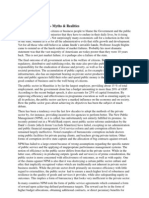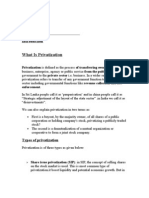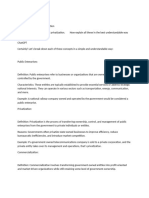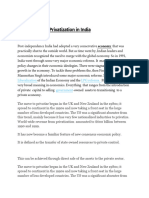0 ratings0% found this document useful (0 votes)
21 viewsForum#2 Quimbo GE311263
Forum#2 Quimbo GE311263
Uploaded by
Prytj Elmo QuimboPrivatizing GOCCs in the Philippines could have both positive and negative economic effects. Positively, privatizing may increase efficiency and productivity as private companies are profit-driven. It could also ease the government's financial burden. However, worries exist about potential job losses and rising costs under private ownership. Striking the right balance between the advantages of privatization and preserving the public interest requires effective regulation and control.
Copyright:
© All Rights Reserved
Available Formats
Download as PDF, TXT or read online from Scribd
Forum#2 Quimbo GE311263
Forum#2 Quimbo GE311263
Uploaded by
Prytj Elmo Quimbo0 ratings0% found this document useful (0 votes)
21 views2 pagesPrivatizing GOCCs in the Philippines could have both positive and negative economic effects. Positively, privatizing may increase efficiency and productivity as private companies are profit-driven. It could also ease the government's financial burden. However, worries exist about potential job losses and rising costs under private ownership. Striking the right balance between the advantages of privatization and preserving the public interest requires effective regulation and control.
Original Title
Forum#2_Quimbo_GE311263
Copyright
© © All Rights Reserved
Available Formats
PDF, TXT or read online from Scribd
Share this document
Did you find this document useful?
Is this content inappropriate?
Privatizing GOCCs in the Philippines could have both positive and negative economic effects. Positively, privatizing may increase efficiency and productivity as private companies are profit-driven. It could also ease the government's financial burden. However, worries exist about potential job losses and rising costs under private ownership. Striking the right balance between the advantages of privatization and preserving the public interest requires effective regulation and control.
Copyright:
© All Rights Reserved
Available Formats
Download as PDF, TXT or read online from Scribd
Download as pdf or txt
0 ratings0% found this document useful (0 votes)
21 views2 pagesForum#2 Quimbo GE311263
Forum#2 Quimbo GE311263
Uploaded by
Prytj Elmo QuimboPrivatizing GOCCs in the Philippines could have both positive and negative economic effects. Positively, privatizing may increase efficiency and productivity as private companies are profit-driven. It could also ease the government's financial burden. However, worries exist about potential job losses and rising costs under private ownership. Striking the right balance between the advantages of privatization and preserving the public interest requires effective regulation and control.
Copyright:
© All Rights Reserved
Available Formats
Download as PDF, TXT or read online from Scribd
Download as pdf or txt
You are on page 1of 2
From the lessons on Global history, what will be the effects (positive and negative) of
privatizing Government Own and Controlled Corporation (GOCC) to our economy?
So what is GOCC? A government-owned and controlled corporation, also known as GOCC, is
a state-owned enterprise that conducts both commercial and non-commercial activity. It was
developed because it is predicated on the notion that there is market failure, necessitating
government intervention through the use of corporate entities known to be effective ways to mobilize
government resources. GOCC's primary characteristic is that the government both owns and
manages it. This indicates that the corporate decision-making procedures, policies, and strategic
direction are significantly influenced by the government, typically through a designated agency or
department. Depending on each GOCC's unique legal system and governance structure, the degree
of governmental influence may differ. In many economies, GOCCs have a big impact on how public
services are delivered, how the economy develops, and how much money the government makes.
However, they may not always perform or function effectively, and problems like political sabotage,
inefficiencies, and a lack of transparency may appear, necessitating continual examination and
governance improvements.
According to Alejo (2019), Philippines is one of the developing countries that utilizes
Government-owned and controlled corporations (GOCCs) to perform not only vital governmental
functions but also purely commercial activities for profit, since the investment environment is not
favorable to private sector participation’. Through GOCCs, the government can deliver basic goods
and services to the public or engage in the business of public utilities or financing services and other
profit-oriented undertakings. The numerous tasks given to the GOCCs by the government show the
important role being played by these enterprises in the growth and development of the country.
GOCCs are an important source of revenue for the national government in the Philippines.
Section 3 of Republic Act 7656 requires all GOCCs to remit at least 50 percent of their annual income
to the national government but it should be noted that not all GOCCs are taxable, as some entities
such as GSIS , SSS , PHIC, HDMF and LWD are exceptions These exempted entities, which include
the Government Employment Insurance System, the Social Security System, the Philippine Health
Insurance Corporation, the Home Development Mutual Fund, and local water districts, provide
essential services and benefits to the public They life insurance, pension plans, disability benefits and
other types of financial assistance. The purpose of these agencies is to help individuals obtain
financial assistance from the government, enabling them to achieve or maintain a minimum standard
of living Although these companies are exempt from certain taxes, it is important to recognize that
they play an important role in providing social security and welfare services to the public. Their
primary goal is to ensure that people have access to essential benefits and financial assistance when
they need it, and to promote the well-being and stability of individuals and families. In summary,
Philippine GOCCs contribute to national government revenues, requiring them to remit a portion of
revenues as dividends Although some GOCCs are exempt from taxation, agencies such as GSIS,
SSS, PHIC, HDMF and LWD provide essential benefits and services to the community it helps to
maintain.
According to Aggarwal and Harper (2001) he privatization link with poverty reduction stems
from the relative ineffectiveness of public ownership to fulfill economic growth needs. Under private
ownership, consumer demand from the poorest members of society is met sooner, while lower
government expenditure on PSEs in terms of subsidies and capital investment provides governments
with an opportunity to increase expenditure on poverty-reducing social services.
Privatization occurs when a government-owned business, operation, or property becomes
owned by a private, non-government party. Privatization may also describe a transition that takes a
company from being publicly trade to becoming privately held. This is referred to as corporate
privatization. Privatization of specific government operations happens in a number of ways, though
generally, the government transfers ownership of specific facilities or business processes to a private,
for-profit company. Privatization generally helps governments save money and increase efficiency.
Privatization proponents contend that because privately owned businesses are profit-motivated to cut
excessive spending, they operate more cheaply and efficiently. Additionally, private organizations are
exempt from the bureaucratic hassles that sometimes befall governmental organizations. Conversely,
opponents of privatization contend that needs like water, power, and schools shouldn't be subject to
market pressures or motivated by profit. Liquor stores and other non-essential companies are run by
the public sector as revenue-generating enterprises in some states and municipalities.
In my own opinion, privatization is essential for our economy because privatization often brings
increased efficiency and effectiveness to previously publicly-run enterprises. Private companies are
typically driven by market competition and profit incentives, which can lead to a greater emphasis on
productivity, cost-effectiveness, and innovation. The introduction of private sector management
practices and expertise can result in streamline operations, better resource allocation, and improved
service quality. Privatization can also ease the financial strain on taxpayers and government budgets.
Budget shortfalls, bureaucratic red tape, and ineffective public enterprises are frequently linked.
Governments can relieve themselves of the cost of maintaining and operating these enterprises by
handing them over to the private sector. This enables governments to reallocate funds to higher
priorities, including social welfare initiatives or building public infrastructure.
In conclusion, the privatization of the GOCC has both positive and negative effects on the
government and the people. The benefits include life insurance, retirement benefits, illness benefits,
funeral loans, and salary loans after you join one of the GOCC agencies, however you must make
monthly contributions to the fund. The privatization of GOCC can also be used to reconstruct roads
and other forms of infrastructure. The drawback is that poverty prevents all Filipinos from making a
monthly contribution. Economic progress and development have been hampered by poverty for many
years. Although privatization has the ability to raise productivity, spur investment, and foster market
competition, worries about job losses, rising costs, and potential monopolistic tendencies must be
addressed. Striking a balance between the advantages of privatization and preserving the public
interest requires effective regulation and control. To guarantee that privatization has a positive impact
on the economy and society as a whole, policymakers should carefully analyze the context,
objectives, and dangers that may be involved.
References
Alejo, A. (2019). A big boost to the Philippine economy. The Manila Times.
https://www.manilatimes.net/2019/06/28/supplements/a-big-boost-to-philippine-economy/575901
Aggarwal and Harper (2001). Privatization and Business Valuation in Transition Economies.
https://www.adb.org/sites/default/files/evaluation-document/35461/files/ses-public-sector.pd
You might also like
- Sample Portfolio InvestmentDocument22 pagesSample Portfolio Investmentwshutop100% (2)
- Pad104 Group Assignment - Introduction To Malaysian Public PolicyDocument19 pagesPad104 Group Assignment - Introduction To Malaysian Public PolicyHwang Ae Ri100% (1)
- Public Enterprise: Theories and Practice in Public AdministrationDocument16 pagesPublic Enterprise: Theories and Practice in Public AdministrationIpe Dimatulac83% (6)
- Engine Makes & ModelsDocument9 pagesEngine Makes & Modelscaptkc80% (5)
- Difference Between Public and Private SectorDocument6 pagesDifference Between Public and Private SectorBatang MalolosNo ratings yet
- Need For The Slow Pace of PrivatizationDocument5 pagesNeed For The Slow Pace of PrivatizationSanchit Garg0% (3)
- Real Estate GuruDocument26 pagesReal Estate GuruRaghu Ram100% (3)
- LCK Holdings ProfileDocument56 pagesLCK Holdings ProfileHoa Nguyen100% (1)
- The Effects of Privatizing GovernmentDocument4 pagesThe Effects of Privatizing GovernmentClaire Kaye CarsonNo ratings yet
- Privatization. Submitted by MilaDocument5 pagesPrivatization. Submitted by MilaAnonymous pG9QzVdONo ratings yet
- Causes of PrivatisationDocument9 pagesCauses of PrivatisationNipunNo ratings yet
- Public Entrepreneurial For Local GovernmentDocument17 pagesPublic Entrepreneurial For Local GovernmentChristian Ian LimNo ratings yet
- Chapter TwoDocument8 pagesChapter Twoabebe kumelaNo ratings yet
- PrivatizationDocument7 pagesPrivatizationAkash MehtaNo ratings yet
- AcknowDocument16 pagesAcknowTrisha DiegoNo ratings yet
- Public Sector Reform MauritiusDocument2 pagesPublic Sector Reform MauritiusDeva ArmoogumNo ratings yet
- Unit - 2 Study MaterialDocument39 pagesUnit - 2 Study MaterialSonali AggarwalNo ratings yet
- Maaiz DM FinalDocument3 pagesMaaiz DM Finalsaira.aminNo ratings yet
- Public Sector Business Organizations by Florinda C. BernardinoDocument15 pagesPublic Sector Business Organizations by Florinda C. BernardinoJona BartzNo ratings yet
- Privatization of Public EnterprisesDocument13 pagesPrivatization of Public EnterprisesAdugnaNo ratings yet
- Case Study & ReflectionDocument4 pagesCase Study & ReflectionBernadette Ruth MasuliNo ratings yet
- Public Private Voluntary Sector For PRM PDFDocument3 pagesPublic Private Voluntary Sector For PRM PDFvionkatNo ratings yet
- Globalization and Its Impact On Indian EconomyDocument27 pagesGlobalization and Its Impact On Indian Economythemother21No ratings yet
- Sample Notes For Public AdministrationDocument20 pagesSample Notes For Public AdministrationschainiNo ratings yet
- Business Env.. PrivatizationDocument8 pagesBusiness Env.. Privatizationklair_deepika5602No ratings yet
- Role of Public SectorDocument13 pagesRole of Public SectorPrince RathoreNo ratings yet
- Chapter 1.2 Public EnterprisesDocument6 pagesChapter 1.2 Public EnterprisesMati MeseretNo ratings yet
- Public Enterpri-WPS OfficeDocument20 pagesPublic Enterpri-WPS OfficeDaniel TochukwuNo ratings yet
- PrivatisationDocument19 pagesPrivatisationNishil MehraNo ratings yet
- KindDocument5 pagesKindIpe DimatulacNo ratings yet
- Pub Ad Seminar PaperDocument10 pagesPub Ad Seminar PaperKYLE CULLANTESNo ratings yet
- Chapter 3 Public EnterprisesDocument6 pagesChapter 3 Public EnterprisesAkkamaNo ratings yet
- Accounting AssDocument10 pagesAccounting AssElla ManNo ratings yet
- Sample Notes For Public AdministrationDocument20 pagesSample Notes For Public AdministrationHarsimran Kaur100% (1)
- Detailed Report On Privatisation and DisinvestmentDocument37 pagesDetailed Report On Privatisation and DisinvestmentSunaina Jain50% (2)
- Public Sector Vs pu-WPS OfficeDocument8 pagesPublic Sector Vs pu-WPS OfficeDawit TilahunNo ratings yet
- Chapter 1Document5 pagesChapter 1Jimmy LojaNo ratings yet
- Privatization and LiberalizationDocument4 pagesPrivatization and LiberalizationChandeswori KojuNo ratings yet
- Privatization NewDocument16 pagesPrivatization Newghp7dr5bbxNo ratings yet
- Seyon c1Document46 pagesSeyon c1Seyon HunpeganNo ratings yet
- Public Enterprise and Sustainable Socio-Economic Development in NigeriaDocument12 pagesPublic Enterprise and Sustainable Socio-Economic Development in NigeriaOlawore EmmanuelNo ratings yet
- Intoduction To Public Finance and Taxation TheoryDocument21 pagesIntoduction To Public Finance and Taxation TheoryAnonymous EPSHB9tXZNo ratings yet
- Complete PrivatizationDocument3 pagesComplete PrivatizationNaziRulJoehaRyNo ratings yet
- A Subsidy Is A Benefit Given To An IndividualDocument10 pagesA Subsidy Is A Benefit Given To An IndividualJasmi Mat JusohNo ratings yet
- BGS EssayDocument7 pagesBGS EssayNishitDilipShahNo ratings yet
- IBE PrivatisationDocument15 pagesIBE Privatisationaleenam.shaheerNo ratings yet
- Public Enterprise and Good GovernanceDocument2 pagesPublic Enterprise and Good GovernanceShylieNo ratings yet
- Areas of Government Regulation of BusinessDocument3 pagesAreas of Government Regulation of Businessgdave8898No ratings yet
- MPA-PA 241N-B - Assignment No. 3Document4 pagesMPA-PA 241N-B - Assignment No. 3inshiraNo ratings yet
- Seyon c1Document13 pagesSeyon c1Seyon HunpeganNo ratings yet
- Policy Notes: Non-Investment-Related Tax Incentives (Nitis) : A Policy PaperDocument18 pagesPolicy Notes: Non-Investment-Related Tax Incentives (Nitis) : A Policy PapermelodymedleyNo ratings yet
- Indian Business Environment - Government Intervention & State PoliciesDocument15 pagesIndian Business Environment - Government Intervention & State PolicieschandrikaNo ratings yet
- Advance PDFDocument8 pagesAdvance PDFKiya Alemayehu100% (1)
- Meeting The Expectations of GlobalizationDocument3 pagesMeeting The Expectations of GlobalizationCedrick John MendozaNo ratings yet
- Technical Art P1 - 11Document3 pagesTechnical Art P1 - 11Andreea DumitruNo ratings yet
- Insurance Regulations in IndiaDocument73 pagesInsurance Regulations in Indiamohit100% (1)
- NPM, BPR, RegoDocument7 pagesNPM, BPR, Regolight&soundNo ratings yet
- Part A Public Sector Financial Reporting in Ghana (Complete) 15 20marks 2Document47 pagesPart A Public Sector Financial Reporting in Ghana (Complete) 15 20marks 2Desmond Grasie ZumankyereNo ratings yet
- Chapter One TaxationDocument10 pagesChapter One TaxationEmebet TesemaNo ratings yet
- Topic 6 Instruments of Fiscal PolicyDocument24 pagesTopic 6 Instruments of Fiscal Policyjadyn nicholasNo ratings yet
- Assignment Course Code: MS - 92 Course Title: Management of Public Enterprises Assignment Code: MS-92/TMA/SEM - I/2017Document14 pagesAssignment Course Code: MS - 92 Course Title: Management of Public Enterprises Assignment Code: MS-92/TMA/SEM - I/2017Rajni KumariNo ratings yet
- What Is PrivatizationDocument10 pagesWhat Is PrivatizationmandeeppathakNo ratings yet
- Gale Researcher Guide for: The Role of Institutions and InfrastructureFrom EverandGale Researcher Guide for: The Role of Institutions and InfrastructureNo ratings yet
- A Radical Solution for the Problems of Bankruptcy and Financial Bottlenecks for Individuals and CompaniesFrom EverandA Radical Solution for the Problems of Bankruptcy and Financial Bottlenecks for Individuals and CompaniesNo ratings yet
- Caesar Cipher Coding ActivityDocument4 pagesCaesar Cipher Coding ActivityPrytj Elmo QuimboNo ratings yet
- Mobile Payment Adoption Among Small Businesses - A Case StudyDocument1 pageMobile Payment Adoption Among Small Businesses - A Case StudyPrytj Elmo QuimboNo ratings yet
- Smart Home Automation System Using IoT for Energy EfficiencyDocument1 pageSmart Home Automation System Using IoT for Energy EfficiencyPrytj Elmo QuimboNo ratings yet
- Enhancing Cybersecurity Awareness Among University Students Through Gamified LearningDocument1 pageEnhancing Cybersecurity Awareness Among University Students Through Gamified LearningPrytj Elmo QuimboNo ratings yet
- Development of a Mobile-Based Mental Health Monitoring Application for University StudentsDocument1 pageDevelopment of a Mobile-Based Mental Health Monitoring Application for University StudentsPrytj Elmo QuimboNo ratings yet
- Sample Application LetterDocument2 pagesSample Application LetterPrytj Elmo QuimboNo ratings yet
- Writing A ResumeDocument13 pagesWriting A ResumePrytj Elmo QuimboNo ratings yet
- Week 3 VLAN ConfigurationDocument13 pagesWeek 3 VLAN ConfigurationPrytj Elmo QuimboNo ratings yet
- Virtual LAN With VoIP Using DHCP Configuration For PCsDocument11 pagesVirtual LAN With VoIP Using DHCP Configuration For PCsPrytj Elmo QuimboNo ratings yet
- Ebsu - Seap Application ProcessDocument9 pagesEbsu - Seap Application ProcessPrytj Elmo QuimboNo ratings yet
- SesclinicwatapampaDocument5 pagesSesclinicwatapampaPrytj Elmo QuimboNo ratings yet
- Class Sched For Fig MaDocument1 pageClass Sched For Fig MaPrytj Elmo QuimboNo ratings yet
- Cce 104 FinalDocument7 pagesCce 104 FinalPrytj Elmo QuimboNo ratings yet
- Quimbo Activity6 CRUDOpreationsDocument19 pagesQuimbo Activity6 CRUDOpreationsPrytj Elmo QuimboNo ratings yet
- Forum#5 Quimbo GE311263Document2 pagesForum#5 Quimbo GE311263Prytj Elmo QuimboNo ratings yet
- Quimbo FinalProjectDocument7 pagesQuimbo FinalProjectPrytj Elmo QuimboNo ratings yet
- Forum#4 Quimbo GE311263Document2 pagesForum#4 Quimbo GE311263Prytj Elmo QuimboNo ratings yet
- Role of MNCs in RetailingDocument19 pagesRole of MNCs in RetailingChinnamuthuNo ratings yet
- Tài liệu không có tiêu đềDocument3 pagesTài liệu không có tiêu đềnguyen102201No ratings yet
- Part III Exam Result 2018, Kumaun University Nainital, UttarakhandDocument1 pagePart III Exam Result 2018, Kumaun University Nainital, UttarakhandShashank SharmaNo ratings yet
- How To Build An ETF Rotation Strategy With More Than 50 Percent Annualyzed ReturnsDocument3 pagesHow To Build An ETF Rotation Strategy With More Than 50 Percent Annualyzed ReturnsLogical Invest100% (1)
- 1206 ItemrateCPWDSCHEDULE1Document2 pages1206 ItemrateCPWDSCHEDULE1zubinNo ratings yet
- Paper 11Document456 pagesPaper 11Anonymous f5qGAcZYNo ratings yet
- Prop Waters To Easement PDFDocument11 pagesProp Waters To Easement PDFCherlene TanNo ratings yet
- New Pie DiDocument4 pagesNew Pie DiKadambari AmleNo ratings yet
- This Study Resource WasDocument2 pagesThis Study Resource WasAnna TaylorNo ratings yet
- Ecosoc Resolution 11 (II) of 21 June 1946Document7 pagesEcosoc Resolution 11 (II) of 21 June 1946Priyanshu UpadhyayNo ratings yet
- MP 08Document4 pagesMP 08Zul IzuddinNo ratings yet
- Timesaver Vocabulary Activities Pre-Intermediate-Intermedia20190804-30302-1at9khmDocument2 pagesTimesaver Vocabulary Activities Pre-Intermediate-Intermedia20190804-30302-1at9khmRania FarranNo ratings yet
- Annual ReportDocument164 pagesAnnual ReportSupriya SarkarNo ratings yet
- Eticket 918720895-YZQRWIDocument1 pageEticket 918720895-YZQRWISunartomo IrNo ratings yet
- Form 26QB: Income Tax DepartmentDocument3 pagesForm 26QB: Income Tax DepartmentAnand JaiswalNo ratings yet
- Statement 2024 1Document5 pagesStatement 2024 1nahidahcomNo ratings yet
- Lighting Fixtures: United StatesDocument4 pagesLighting Fixtures: United StatesMichael WarnerNo ratings yet
- Personal Protective Equipment (PPE) Body Coverall Certificate List - DRDO As On 29.06.2020Document28 pagesPersonal Protective Equipment (PPE) Body Coverall Certificate List - DRDO As On 29.06.2020Emphorasoft gmailNo ratings yet
- Marketing Segmentation: Assignment - 02Document7 pagesMarketing Segmentation: Assignment - 02Swaraj DubalNo ratings yet
- TDS Challan2009-2010Document18 pagesTDS Challan2009-2010ANJAIAHCHARYNo ratings yet
- Grade 10 Provincial Exam Economics P1 (English) June 2017 Possible AnswersDocument14 pagesGrade 10 Provincial Exam Economics P1 (English) June 2017 Possible AnswersLinda DladlaNo ratings yet
- Anti-Money Laundering Act 2010 - A Critical Analysis 0Document14 pagesAnti-Money Laundering Act 2010 - A Critical Analysis 0Hasnain amjad ranaNo ratings yet
- Simple InterestDocument9 pagesSimple InterestJayasuryaNo ratings yet
- Tice of Scheduled From-Oct. 1-4, 2024Document2 pagesTice of Scheduled From-Oct. 1-4, 2024yeroma.mrNo ratings yet
- Learners and ApprenticesDocument6 pagesLearners and ApprenticesBec Bec Bec100% (1)
- Lecture 11 - Project Resources PlanningDocument13 pagesLecture 11 - Project Resources Planningjbjuanzon100% (1)










































































































